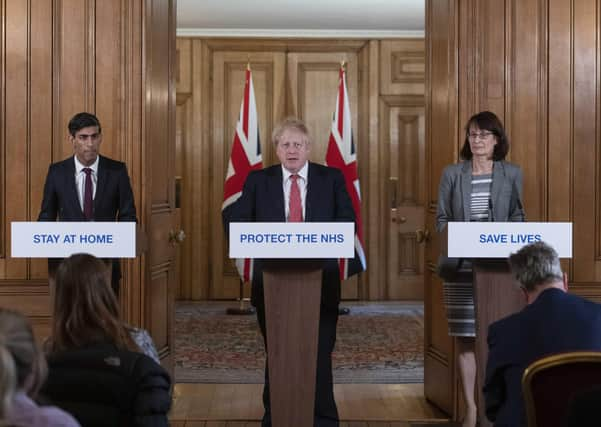Government to pay 80% of wages to get workers through the crisis


Chancellor Rishi Sunak said the unprecedented step would allow employees to keep their jobs, and told businesses: “The government is doing its best to stand behind you and I’m asking you to do your best to stand behind our workers.”
Any company will be able to apply to a new coronavirus job retention scheme to cover most of the wages of employees who are furloughed and not working, but who are kept on payroll rather than being laid off.
Advertisement
Hide AdAdvertisement
Hide AdThe government will pay 80 per cent of earnings, up to a limit of £2,500 per month – slightly more than the average UK wage. There will be no limit to the size of the fund.
“Please look very carefully at that support before making any decisions to lay people off,” Mr Sunak said. “It’s on all of us.”
Unveiling what he called “unprecedented measures for unprecedented times”, the Chancellor appealed to members of the public to support each other.
Mr Sunak said: “The actions I’ve taken today represent an unprecedented economic intervention to support the jobs and incomes of the British people.
“Unprecedented measures for unprecedented times.
“Now more than at any time in our history we will be judged by our capacity for compassion. Our ability to come through this won’t just be down to what government or businesses do, but the individual acts of kindness that we show each other.”
For self-employed workers, all tax payments under self-assessment will be delayed until January 2021, and they will be able to claim Universal Credit up to the level of statutory sick pay – £92 per week.
The Chancellor also extended support for business, with the interest-free period for a new loan fund for small businesses extended from six months to 12 months. The £330 billion scheme will launch on Monday.
VAT payments will also be deferred this quarter at a cost of £30bn, with no payments due until June. Businesses will have until the end of the financial year to settle their VAT bill.
Advertisement
Hide AdAdvertisement
Hide AdAn additional £1bn will be put towards increasing Universal Credit and housing benefit, with housing payments raised to cover at least 30 per cent of market rents.
Shadow Chancellor John McDonnell said the government had “shifted direction, but unfortunately not far enough or fast enough”.
He repeated Labour’s call for statutory sick pay to be raised to the level of average earnings.
“Sick pay is being left at a level that the health secretary said he could not live on, yet this is what the self-employed are being asked to get by on,” Mr McDonnell said.
“The Chancellor’s wage protection plan sets out no obligation for employers to keep staff on, and no commitment to full wages being paid, with the cap on incomes meaning that many people will take a significant pay cut.
“This will also take some weeks to roll out at a time when wages need to be guaranteed more urgently.”
SNP Westminster leader Ian Blackford welcomed the package, but said the party would “seek further support for the self-employed, improved sick pay, and strengthened welfare protection for everyone”.
The measures were also hailed by unions, with the GMB general secretary Tim Roache saying the “unprecedented” package would give “businesses and workers enhanced security and will help us recover in the long term”.
Advertisement
Hide AdAdvertisement
Hide AdMr Roache added: “We will be pushing hard for all those employers that can afford it to pay an extra 20 per cent to secure the incomes of their employees.”
And business leaders also backed the government’s bold action, with the director of CBI Scotland saying it “marks the start of the UK’s economic fightback – an unparalleled joint effort by enterprise and government to help our country emerge from this crisis with the minimum possible damage”.
Meanwhile, mortgage lenders have been told not to consider home repossessions during the coronavirus crisis.
City regulator the Financial Conduct Authority (FCA) said it expects lenders to stop repossession action, regardless of whether borrowers’ incomes are affected by coronavirus. “During this current period of unprecedented uncertainty and upheaval, we do not think people should be at risk of losing their homes,” the FCA said on its website.
The FCA also said lenders offering payment holidays to home owners affected by coronavirus must not add on extra charges, apart from interest.
Lenders have already said they will offer three-month payment holidays, if appropriate, for mortgage customers whose finances are affected by coronavirus. The FCA said this should not affect borrowers’ credit scores.
Comments
Want to join the conversation? Please or to comment on this article.